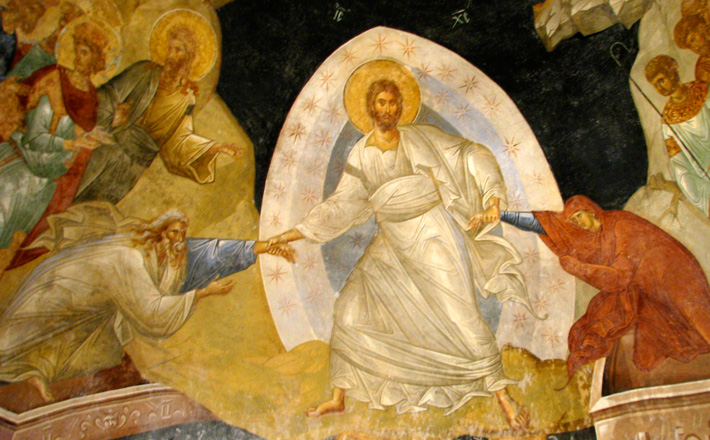Commentary on Haggai 1:15b-2:9
Haggai is dangerous.
The hazard stems from the fact that Haggai’s message is all too easily twisted into a message ripe for preachers of the so-called “prosperity gospel” and for those who have too long listened to them. A premise of that pseudo-gospel is that God wills financial and physical blessings for true believers. The Bible — and especially the Old Testament — serves as a contract between God and the disciple. Those who have a faith that evidences a positive confession, the will to visualize financial success, and the daring to donate generously to Christian ministries will be blessed by God.
Naturally, that theology has nothing to do with the Gospel of Christ. Neither Jesus nor his disciples prospered or were successful by those standards. How many Christians have had their faith shipwrecked by a message that deluded people into thinking that if they were not wealthy or healthy it was because they lacked sufficient faith?
Nevertheless, Haggai can be forced to speak for the prosperity preachers, a well-considered message might rescue the prophet, especially since Haggai speaks in other, more helpful ways about our work and prosperity.
We know nothing of the prophet himself, other than his ministry occupied mid-August to mid-December of the year 520 BCE, the second year of Darius I (the Great). The present oracle is dated in October of that year.
Nearly two decades earlier, in 539 BCE, the Persian king Cyrus conquered Babylon and repatriated the Babylonian exiles, including the Hebrews (Ezra 1:1-4). The Persian appointed governor, Sheshbazzar, seems to have started to rebuild the Temple (Ezra 5:14-16), but work stopped.
In Haggai’s day, the Temple remained “on the drawing boards.” Some insisted that the time was still not right to rebuild the LORD’s house (Haggai 1:2).
It is not hard to imagine their arguments. Doubtless they were the ancient version of why our contemporaries oppose spending that will benefit all: the market is down, future stocks are shaky, and the economy’s growth is stagnant, there is just so much money to go around, etcetera.
Haggai addressed Zerubbabel, governor of Judah, Joshua son of Jehozadak, the high priest, and the remnant of the people (Haggai 2:2). A few months before, he had successfully convinced that same audience that they fared poorly and suffered a draught because they had not rebuilt the Temple (1:5-11). So “they came and worked on the house of the LORD of hosts, their God” (1:14).
Evidently, the work was discouraging. Haggai invites the senior citizens who remembered Solomon’s Temple, destroyed sixty-seven years before, to compare it to the present construction project. “Is it not it [the present Temple] in your sight as nothing?” (Haggai 2:3). Naturally, the present project could not measure up to Solomon’s Temple. Besides being underfinanced, the Second Temple did not contain the Ark of the Covenant protected by carved cherubim, the stone tablets, the molten sea, or any of the original artifacts of ancient Israel’s cult.
Nevertheless, Haggai says, Zerubbabel, Joshua, and the remnant people should “take courage” and continue to “work, for I am with you” (Haggai 2:4) and because, the LORD says, “My spirit abides among you; do not fear” (2:5b).
The latter assurance is based on “the word that I covenanted” when the Hebrews came out of Egypt (Haggai 2:5, Jewish Publication Society). The verse may allude to Exodus 34:10(-27) where the LORD covenants to do marvels theretofore unknown such that “all the people among whom you live shall see the work of the LORD” (Exodus 34:10).
In Haggai, the LORD promises to be near, this time in the believers’ work.
The assurance of divine presence is the gospel promise of this passage. Haggai assured his contemporaries that the LORD was present in their labor, blessing it with God’s own spirit. The positive results of their labor were assured even if, in the middle of their tasks, the building looked a little cockeyed and less than splendid.
Might we not make that bold claim for own labors? I believe so, yes. Whatever it is to which God has called us, whatever our projects and tasks, and no matter how less than splendid our efforts may look to our critical eye today, work done by the people of God is always done with the promise of glory. And sometimes — not always, but once in a graceful while — we get to see a glimmer of that glory. Sometimes we are permitted to see God at work through us, among us. The psalmist puts it this way:
16 Let your work be manifest to your servants, and your glorious power to their children.
17 Let the favor of the Lord our God be upon us, and prosper for us the work of our hands– O prosper the work of our hands! (Psalm 90:16-17)
Few of us build temples or churches. Perhaps our temple is feeding the hungry or advocating justice for the poor. Perhaps our temple construction has to do with caring for our families, or being as kind and loving as we can in our daily vocations, letting God’s work be seen through our own.
That Haggai’s new Temple would be filled with splendor is assured. “In a little while” the LORD would shake the creation, a sure theophanic sign (Haggai 2:6). Likewise, the LORD would shake loose the treasures of all the nations of the earth in order to fill the Temple with splendor (2:7; see Isaiah 60). The silver and gold of both the creation and of the nations are rightfully God’s (2:8) who would use it to make the new Temple even more splendid than the last (2:9).
Best of all, however, the Temple would be a place of peace (salom, often transliterated as shalom). The New Revised Standard Version, like the Revised Standard Version before it, suggests that the glorious Temple will be a place of “prosperity” (Haggai 2:9). Shalom, however, most often indicates wholeness, wellness, and security. The Temple’s splendor may derive in a transient, superficial way from silver and gold, but its well-being, its shalom, is the consequence of the LORD’s divine decision. So is our work and, for that matter, so are we all.


November 6, 2016